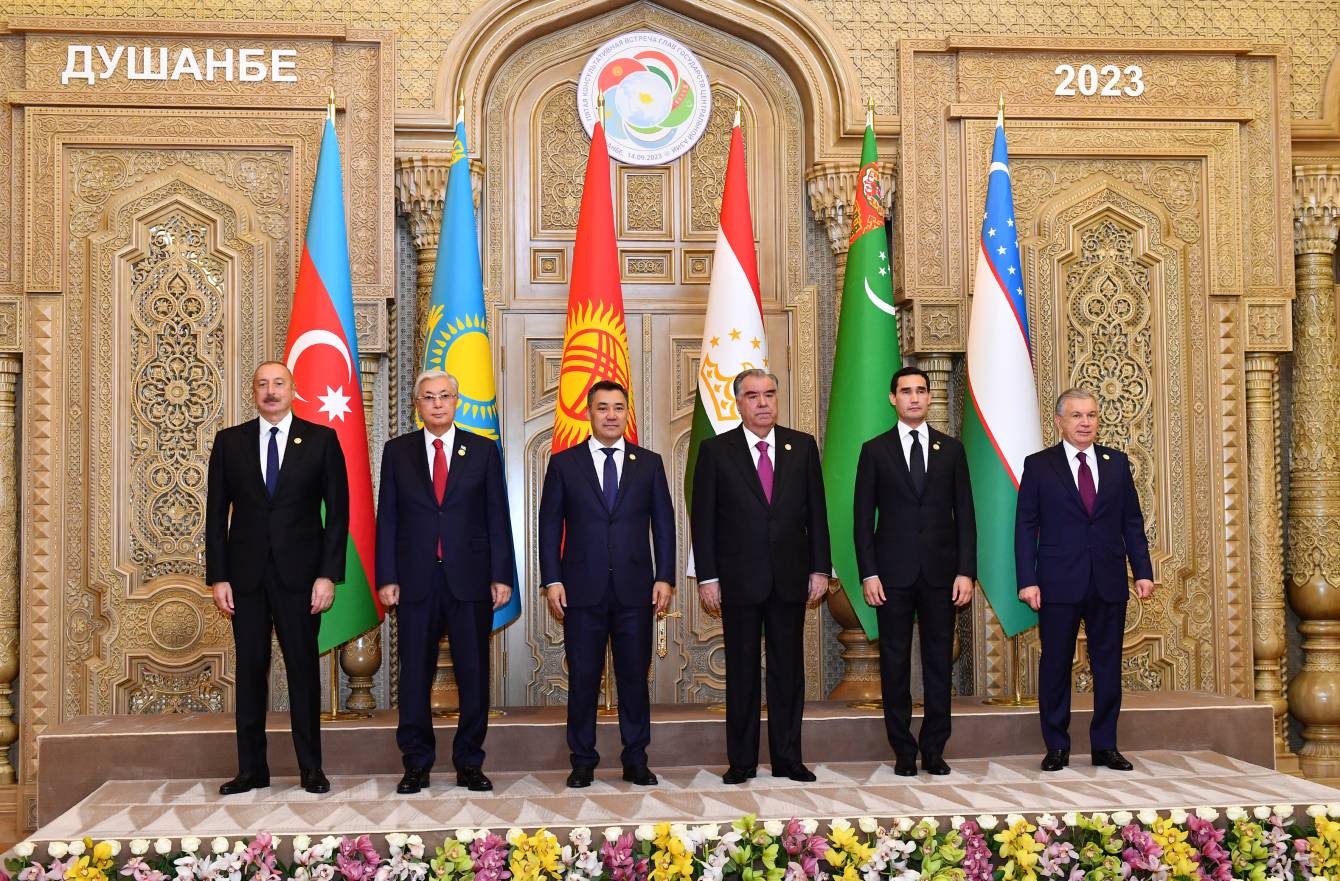Azerbaijan intends to expand contributions towards faster cargo movement on the East-West routes, President Ilham Aliyev said as he provided details on the projects implemented by Baku.
Speaking at the 5th Consultative Meeting of the Heads of State of Central Asia held in Tajikistan, Aliyev outlined the transport cooperation between Azerbaijan and Central Asia as one of the driving forces in the bilateral relationship.
“The sphere of transportation and logistics holds an essential place in our relations. For the Central Asian countries, Azerbaijan is a reliable transit country along the route to the markets of Türkiye and Europe,” he said, adding that transit in the opposite direction is also of significance.
“Our brothers in Central Asia know that Azerbaijan’s entire transportation and logistics infrastructure is available to them,” he noted, reaffirming Baku’s commitment to helping Central Asian nations reach European markets.
Baku is focusing on its rising importance for transcontinental trade and transport connections. The leading railway line and maritime port in the country are undergoing upgrade to address the growing cargo transportation demand on the East-West route.
“We are modernizing the Baku-Tbilisi-Kars railway…. The cargo volume via that road will be increased from 1 to 5 million tons (per annum). In parallel to that, the capacity of the Baku Trade Port is also being expanded from current 15 to 25 million tons,” Aliyev noted.
Although Azerbaijan owns the largest trade fleet of over 50 vessels in the Caspian Sea, the President said investment projects are being implemented to increase the number of manufactured tankers and dry cargo vessels from the current 6 to 10-15 vessels annually.
The 829-kilometer-long Baku-Tbilisi-Kars (BTK) line links Azerbaijan’s railway network to the railroad grid of Türkiye and enables an easier and faster rail connection between China, Central Asia, and Europe.
Starting from Baku, trains on BTK rails cut through Georgia’s capital Tbilisi towards the final destination of Kars in northeast Türkiye. A 504-kilometer portion of BTK passes through Azerbaijan, while Georgia and Türkiye have 246-kilometer and 79-kilometer sections, respectively.
The BTK railroad cuts the overland journey between China and Europe to 15 days instead of 25-45, making it twice as fast as sea transport and less than half the price of air travel. In its full swing, annual cargo deliveries on the line will reportedly reach 17 million tons. Since its launch in 2017, it has transported nearly 1.5 million tons of cargo.
The BTK also forms part of a 5,000-kilometer-long Middle Corridor stretching from the northwestern Edirne province of Türkiye to the Katonkaragay district on the eastern edge of Kazakhstan. Currently, 3 to 5 percent of overland cargo from China to Europe passes through the Middle Corridor. The authorities of Azerbaijan, Türkiye, and the Central Asian countries aim to increase it to around 30 percent in the coming years.
The Central Asian region, with its limited reach to Western markets due to its geography, has been seeking economic diversification by throwing weight behind various ambitious projects such as China’s Belt and Road Initiative (BRI). For regional states, the BTK route emerges as a logical continuation of the multi-billion-dollar BRI project to achieve a safe, cheaper and faster connection with Europe.
On November 5, 2017, the first train cargo carrying 600 tons of wheat left Kazakhstan toward the Turkish port of Mersin via the BTK route. The train completed the 1,258-km journey between the two destinations in about 30 hours.
The first successful transit of goods encouraged the Kazakh authorities to expand their plans for the BTK railway. Astana sees BTK as a valuable part of the transportation corridors from China through the Central Asian region and the Caspian basin, paving the way to European markets.
Landlocked Uzbekistan is also keen on the BTK route. Since 2016, there have been high-level consultations between Baku and Tashkent to expedite the latter’s opportunities to use the BTK’s capacity for European exports.
Uzbekistan is known for its diversified exports, including coal and cotton, the production of which has been on a constant rise due to foreign investments’ influx. Analysts estimate the BTK to help Uzbekistan increase its overall trade turnover, enabling the country to facilitate and diversify its exports.
For Turkmenistan, the BTK is a highly efficient alternative route to reach the European marketplace. Sitting on huge reserves of fossil fuel, primarily natural gas, Ashgabat has been seeking more beneficial transport connections between the South Caucasus and Central Asia, which could bring access to the 760-million market of the continent. In this context, the BTK railway sits well in the plans of the Turkmen government to make more inroads into the overseas markets.







 President Ilham Aliyev shed light on the evolving contours of the peace process with Armenia during an international conference in Baku this week. ...
President Ilham Aliyev shed light on the evolving contours of the peace process with Armenia during an international conference in Baku this week. ...
 Azerbaijan and Armenia started the process of demarcation of their border on Tuesday, with the installation of the first border markers based on ge...
Azerbaijan and Armenia started the process of demarcation of their border on Tuesday, with the installation of the first border markers based on ge...
 Iran and Pakistan have signed eight cooperation documents in various fields, and agreed to strengthen ties to fight terrorism in the region.
Iran and Pakistan have signed eight cooperation documents in various fields, and agreed to strengthen ties to fight terrorism in the region.
 As the conflict between Ukraine and Russia escalates, the strategic importance of Kharkiv, Ukraine's second-largest city, has come sharply into focus.
As the conflict between Ukraine and Russia escalates, the strategic importance of Kharkiv, Ukraine's second-largest city, has come sharply into focus.
 Iranian President Ebrahim Raisi expressed Tehran’s readiness to participate in significant development projects in Sri Lanka during the inauguratio...
Iranian President Ebrahim Raisi expressed Tehran’s readiness to participate in significant development projects in Sri Lanka during the inauguratio...



